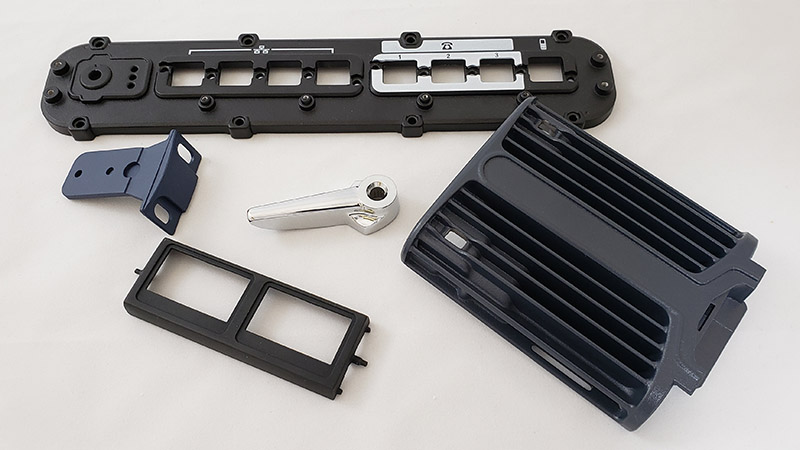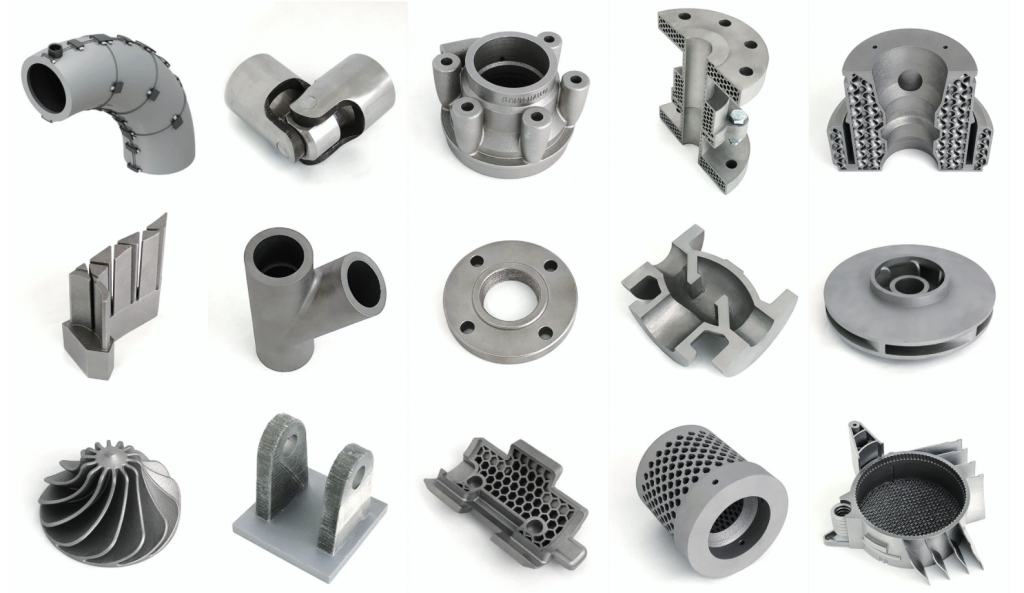Recognizing the Production Process and Maintenance Practices for Aluminum Foundry Products
The manufacturing procedure for aluminum shop items is detailed and requires a comprehensive understanding of multiple stages. From the melting of aluminum at heats to different casting approaches, each step plays a crucial duty. In addition, upkeep practices assure tools remains effective and products are devoid of defects. However, the complexities of these processes and their effect on item high quality raise important questions concerning finest techniques and innovative methods in the sector.
Summary of Light Weight Aluminum Foundry Products
Light weight aluminum factory items are vital parts in different industries, offering a mix of lightweight stamina and corrosion resistance. These items are commonly utilized in fields such as automotive, aerospace, and building, where resilience and effectiveness are paramount. Aluminum's reduced thickness makes it a perfect product for applications calling for decreased weight without giving up structural honesty. The convenience of light weight aluminum enables for the production of complex geometries, accommodating varied design needs.
Furthermore, light weight aluminum foundry products can be tailored with different alloys to enhance certain buildings, such as enhanced thermal conductivity or enhanced hardness. Their resistance to oxidation and rust warranties longevity, making them suitable for both indoor and outside applications. The mix of these characteristics adds to the expanding choice for aluminum in modern-day production. As industries look for to maximize efficiency and sustainability, light weight aluminum shop items continue to play a vital role in fulfilling these needs.
Melting Refine: Changing Light Weight Aluminum
The melting procedure is an essential action in the production of light weight aluminum foundry products, as it transforms strong aluminum into a liquified state appropriate for casting. This procedure generally occurs in a heater, where scrap aluminum or ingots are heated up to temperatures around 660 degrees Celsius. The choice of furnace-- be it electric, gas, or induction-- impacts the effectiveness and price of melting.
Throughout melting, mindful factor to consider is offered to the removal of impurities, such as oxides and other contaminants, which can detrimentally affect the high quality of the end product. Changes may be added to help in this purification process, enhancing the fluidness of the liquified metal.
Additionally, temperature level control is necessary to ensure harmony and stop getting too hot, which can lead to oxidation. The melting procedure not only prepares aluminum for spreading however also plays a significant role in determining the honesty and properties of the final shop items.
Casting Techniques in Light Weight Aluminum Foundry
Different spreading strategies are employed in aluminum foundries to create premium parts, each matched to different applications and specifications. Among the most commonly made use of methods are sand casting, pass away casting, and investment casting. Sand casting uses a blend of sand and binder to develop molds, enabling for large components and intricate forms (aluminum metal casting). Pass away casting, identified by the high-pressure injection of liquified light weight aluminum into steel molds, generates precise and repeatable parts, suitable for automation. Investment spreading, or lost-wax casting, entails creating a wax design that is coated in a ceramic shell, making it possible for complex designs and great information. Each strategy has its advantages; sand casting is affordable for low-volume manufacturing, while die spreading provides performance for high-volume runs. Investment casting is preferred for components requiring extraordinary precision and surface coating. Selecting the ideal strategy depends on Your Domain Name elements such as production quantity, part intricacy, and material buildings
Ending Up Processes for Aluminum Parts
After casting techniques have shaped the light weight aluminum components, ending up procedures play a considerable function in enhancing their performance and aesthetic appeal. These procedures commonly include machining, surface therapy, and layer applications. Machining involves accurate elimination of product to attain desired measurements and surface top quality. This is essential for making sure that components fit flawlessly into their designated applications.
Surface therapies, such as anodizing and polishing, are utilized to enhance deterioration resistance and enhance aesthetic characteristics. aluminum metal casting. Anodizing, specifically, provides a safety oxide layer, making the light weight aluminum more aesthetically attractive and resilient

Upkeep Practices for Longevity
Implementing routine upkeep practices is essential for making sure the durability of light weight aluminum shop items. Regular evaluations need to be performed to recognize deterioration, as very early discovery can prevent costly repair work and prolong the lifespan of parts. Cleansing devices and equipment on a regular basis minimizes the danger of contamination, which can adversely influence product top quality. Lubrication of relocating components is also crucial, as it reduces rubbing and wear, boosting functional effectiveness.
Additionally, the application of a precautionary upkeep routine assists in systematically resolving possible problems prior to they escalate (Aluminum Casting). This consists of checking for leaks, guaranteeing correct placement, and calibrating machinery. Team training on appropriate handling and upkeep techniques fosters a society of care, which is crucial for maintaining product honesty. Documenting maintenance activities gives beneficial insights into performance patterns, allowing for educated decision-making concerning future maintenance techniques.
Quality Assurance and Screening in Light Weight Aluminum Shop Production
Quality assurance and testing are vital in light weight aluminum foundry manufacturing, as they ensure that final items meet defined standards and consumer expectations. This procedure begins with raw product assessment, making sure that aluminum alloys conform with called for compositions. Throughout the manufacturing cycle, you can find out more in-process examinations are conducted to check criteria like product, pressure, and temperature flow.
Once spreading is total, numerous examinations-- such as dimensional checks, aesthetic evaluations, and non-destructive testing-- are carried out to recognize any kind of issues. Mechanical properties, consisting of tensile toughness and hardness, are examined with standardized testing techniques.
Moreover, adherence to sector standards, such as ISO and ASTM, is crucial for ensuring item quality. Statistical process control strategies are typically employed to assess manufacturing data and facilitate continual enhancement. By executing strenuous top quality control procedures, aluminum shops can enhance product reliability and minimize waste, eventually leading to higher customer fulfillment and functional performance.
Frequently Asked Questions
What Are the Environmental Effects of Light Weight Aluminum Foundry Operations?
Light weight aluminum shop operations can lead to significant environmental impacts, including air pollution from exhausts, water contamination from waste discharge, and power consumption adding to greenhouse gas discharges, eventually impacting local ecosystems and neighborhood health and wellness.
Just How Do Aluminum Prices Impact Factory Manufacturing Choices?
Aluminum costs significantly affect factory manufacturing decisions; higher prices might bring about lower output or boosted effectiveness measures, while reduced prices can urge enhanced production and financial investment in new innovations to enhance competition and profitability.
What Precaution Are Essential in Light Weight Aluminum Foundries?
Essential safety procedures in aluminum factories consist of protective gear, appropriate air flow to lower breathing of fumes, regular equipment upkeep, training on emergency situation treatments, and adherence to security procedures to stop mishaps and injuries among workers.
Can Light Weight Aluminum Be Recycled, and How Is It Refined?
Light weight aluminum can undoubtedly be reused. The process involves collection, melting, and changing the material into brand-new items, substantially minimizing energy consumption and environmental impact contrasted to main light weight aluminum production while maintaining worldly high quality.
What Are Common Flaws in Aluminum Spreading and Their Causes?

The manufacturing process for light weight aluminum shop items is elaborate and calls for a complete understanding of numerous stages. Aluminum shop items are essential elements in various markets, supplying a mix of best site lightweight stamina and deterioration resistance. The melting procedure is a basic step in the manufacturing of light weight aluminum foundry products, as it changes strong light weight aluminum right into a molten state ideal for casting. Applying routine upkeep practices is crucial for making certain the longevity of light weight aluminum shop items. Quality control and testing are paramount in aluminum foundry manufacturing, as they guarantee that final products meet specified standards and consumer assumptions.